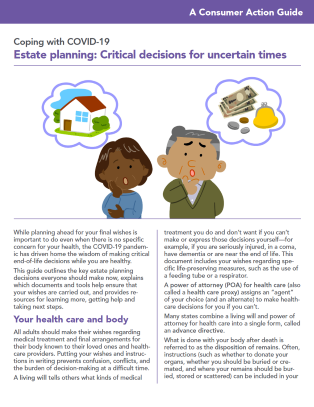Estate planning: Critical decisions for uncertain times
Coping with COVID-19
The COVID-19 pandemic has driven home the wisdom of making critical end-of-life decisions before a crisis strikes. This publication outlines the key estate planning decisions everyone should make now, explains which documents and tools help ensure that your wishes are carried out, and provides resources for learning more, getting help and taking next steps.

Publication Series
- This publication is part of the COVID-19 Educational Resources training module.
Download File
PDF files may contain outdated links.
Estate planning: Critical decisions for uncertain times
File Name: Estate_Planning_COVID_2020_EN.pdf
File Size: 0.5MB
Languages Available
Table of Contents
While planning ahead for your final wishes is important to do even when there is no specific concern for your health, the COVID-19 pandemic has driven home the wisdom of making critical end-of-life decisions while you are healthy.
This guide outlines the key estate planning decisions everyone should make now, explains which documents and tools help ensure that your wishes are carried out, and provides resources for learning more, getting help and taking next steps.
Your health care and body
All adults should make their wishes regarding medical treatment and final arrangements for their body known to their loved ones and healthcare providers. Putting your wishes and instructions in writing prevents confusion, conflicts, and the burden of decision-making at a difficult time.
A living will tells others what kinds of medical treatment you do and don’t want if you can’t make or express those decisions yourself—for example, if you are seriously injured, in a coma, have dementia or are near the end of life. This document includes your wishes regarding specific life-preserving measures, such as the use of a feeding tube or a respirator.
A power of attorney (POA) for health care (also called a health care proxy) assigns an “agent” of your choice (and an alternate) to make healthcare decisions for you if you can’t.
Many states combine a living will and power of attorney for health care into a single form, called an advance directive.
What is done with your body after death is referred to as the disposition of remains. Often, instructions (such as whether to donate your organs, whether you should be buried or cremated, and where your remains should be buried, stored or scattered) can be included in your living will or advance directive; if not, you can write them separately. State laws vary regarding whether your written wishes must be honored. In states that do have personal preference laws, there are varying requirements for making written wishes enforceable (witnesses, notarization, etc.).
These various planning documents can be created with or without an attorney, but they must meet your state’s requirements, and typically must be witnessed or notarized (electronically may be an option under certain circumstances). Make sure that the people you choose are given, or know how to find, these and any other estate planning documents.
Learn more:
- The Mayo Clinic (living will/advance directive overview)
- Nolo (COVID-related estate planning advice)
- American Bar Association (state-specific advance directive forms)
- Funeral Consumers Alliance (state personal preference laws)
- PREPARE (multilingual planning guidance for COVID-19)
Assets and belongings
Your last will and testament allows you to control how your assets and belongings (that are not transferred directly upon death through other means; see below) are distributed after you die, and to name guardians for your children and pets. The executor you name in the will is responsible for seeing that your wishes are carried out and your assets are distributed as the will directs. If you die without a will (intestate), the courts (according to state law) will make these decisions for you. The distribution of your assets through your will is called probate; the process can take months (or even years).
Some assets (such as bank, retirement, brokerage and other investment accounts, and the proceeds from a life insurance policy) can be transferred directly upon your death, without having to go through probate, if you name one or more beneficiaries on the account or insurance policy. This can be particularly useful when the money in the account would be needed by your heirs to pay bills and funeral costs while the will is in probate. The beneficiary designation on these types of assets (often referred to as payable-on-death or transfer-on-death accounts) generally supersedes (takes precedence over) a will, so it’s very important to revisit your beneficiary choices regularly, particularly during significant life changes, such as (re)marriage, divorce, death of a beneficiary, etc.
Property you own with someone else during your lifetime (such as your home, a rental property, financial accounts and investments) also can be passed directly to the co-owner(s) after you die through titling—the way the asset or property is legally owned. The title you should use (community property with right of survivorship, joint tenancy with right of survivorship, or tenancy by the entirety, for example) depends on your estate and tax planning goals, the type of property or asset, and the state you live in. It’s important to revisit your ownership titles during significant life changes.
A revocable living trust is another way of distributing your property, either during your lifetime or after your death. It is typically used to avoid probate and save on taxes, but has some other advantages as well (such as authorizing a trustee to manage your assets for your benefit if you become incapacitated). Because a trust can be costly to establish, it’s worth it to explore options such as beneficiary designations and titling that achieve some of the same goals.
A durable power of attorney authorizes someone to make financial and legal decisions on your behalf, ensuring that the person entrusted with your important financial and legal matters is your choice rather than a person appointed by the court (conservatorship). It is important to establish a durable power of attorney while you are still healthy because it is only valid if it is created while you are competent (of sound mind).
Learn more:
- Nolo (writing a will)
- ElderLawAnswers (POD and TOD accounts)
- Nolo (joint ownership)
- Investopedia (trust overview and pros and cons)
- Investopedia (detailed power of attorney information)
- American Bar Association (links to estate planning information and FAQs)
See “Legal assistance,” below, for resources related to hiring an attorney.
Your digital assets
Virtually all states have by now implemented a law that governs access to digital assets (your online accounts and mobile apps for banking, email, social media, video and photo sharing, music, gaming, personal websites, blogs, cryptocurrency, etc.). However, the guidelines may not match your own wishes, and gaining access to an account without the login credentials—even if legally allowable—can be extremely time-consuming and burdensome for your heirs.
Having a digital estate plan gives you control over who—if anyone—should have access to each account, and ensures that those who need access after you die (to pay your bills, for example) have it. There are many businesses and organizations that provide guidance, forms and online tools for managing your digital estate (including naming a “digital executor,” providing account instructions, storing login credentials, and more).
Learn more:
- Financial Times (digital estate planning overview)
- Everplans (digital estate planning laws by state)
- Digital Legacy Association (tutorials and guides)
- Consumer Action (digital estate planning issue of newsletter)
Legal assistance
While there are some estate planning tasks that can be accomplished relatively easily without an attorney, others are more complex (such as establishing a trust), and there can be serious consequences if handled incorrectly. An estate attorney can also provide valuable guidance and advice (for example, how you can reduce or avoid estate taxes). The cost of estate planning can vary widely, depending on the attorney, the state where you live, and how complex your estate is. If you hire an attorney, be sure they are experienced in estate and trust law in your state.
If you have moderate income, visit the American Bar Association’s “Affordable Legal Services” page for resources in your state. LawHelp is another resource for finding free (pro bono) or sliding-scale legal help.
Military OneSource, a Department of Defense-funded program, provides resources, including legal services, for military personnel, spouses, family members and survivors. Visit its Estate Planning webpage for more information.
Learn more:
- Forbes (finding an estate planner)
- Nolo (cost of estate planning)
- American Bar Association (ABA) (state-by-state bar and attorney search tool)
Published / Reviewed Date
Published: August 03, 2020
Download File
Estate planning: Critical decisions for uncertain times
File Name: Estate_Planning_COVID_2020_EN.pdf
File Size: 0.5MB
Sponsors

Notes
This guide was created as part of Consumer Action’s COVID-19 Educational Project.
Filed Under
Copyright
© 2020 –2024 Consumer Action. Rights Reserved.



